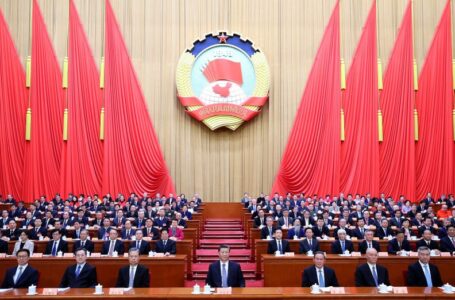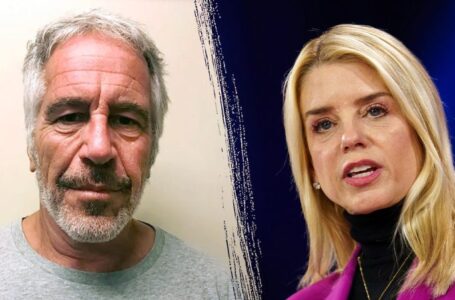Trump to deliver first address of his second term to joint session of Congress
India’s ‘godmen’: How a rigid caste system has created a new kind of deity


The devotees rushed to collect soil from the ground the man had just walked on, thousands thronging to the front of a venue densely crammed with a quarter of a million people, under stifling heat.
But one by one, many began falling onto the muddy field and into a sewer nearby, crushing each other as panicked screams pierced the air.
They had arrived to receive spiritual enlightenment, but 121 people – mostly women – were killed by the crowd crush in northern India’s Uttar Pradesh state last week. Those who survived were left scarred and traumatized.
The man they had come to see was known to his disciples as Bhole Baba, a self-styled Hindu spiritual leader worshipped by many as a living god.
And he is among dozens of spiritual gurus in the country who inspire devotion in millions of followers, have the ear of the Indian elite, and rake in colossal sums of money.
While the world’s most populous nation has long produced self-styled “godmen”, the tradition has, over the last few decades, evolved into a multimillion-dollar industry, whose biggest stars control vast philanthropic and business empires. A large chunk of their money comes from their followers’ donations.
They are widely revered in a country where religion and faith dictate much of society – with some even winning endorsement from the highest echelons of society.
But that industry occasionally finds itself mired in controversy, with several holy men either convicted or accused of a range of crimes – from financial fraud to murder and rape – alarming those who cast doubt on their divine personas.
“It’s a question we’ve long asked,” said Meera Nanda, author of “The God Market: How Globalization is Making India More Hindu.”
“What brings literally millions of poor, desperate people to these godmen?”
A sense of belonging
Subhash Lal was working as a security guard nearly 200 kilometers (124 miles) from Mughal Garhi village, where Bhole Baba was delivering his sermon, when the news flashed across his TV screen.
Lal’s mother, a devout follower of the guru, was among the crowd, and he was desperate for answers. Lal and his family rushed to the hospital that was treating the survivors, when his son learned of the devastating news.
“He told me, Dad, your mother is no more,” the 48-year-old said. “My mother believed in (Bhole Baba). I couldn’t tell her anything. She would attend these functions… she believed in him. What could I do?”
People like Lal’s mother – poor and on the lower rungs of India’s hierarchical caste system – make up the bulk of Bhole Baba’s following. They are predominantly Dalit women from India’s most populous state, Uttar Pradesh, where religion holds particular sway. And for them, a sense of devotion to these godmen is a way to be seen and heard within the Hindu religion.
Despite being outlawed in 1950, the caste system, which categorizes Hindus at birth and once forced the so-called “untouchables” or Dalits to the margins of society, is still omnipresent in the daily lives of millions across the nation.
Policeman turned preacher
Reportedly born Narayan Sakar to a low-caste family, Bhole Baba used to be a constable with the Uttar Pradesh Police before becoming a preacher and establishing an ashram – or place of worship – in the state.
Sitting on an ornately decorated chair, he often delivers impassioned sermons exhorting his followers to maintain their devotion.
“If, through the medium of truth, you remove old trash from within you, and today if you let truth into your heart, devotion for the god into your heart, humanity into your heart… then know that even if the world abuses you, you will not get affected by it at all,” he can be heard saying in one of his speeches.
The “rigidity of caste structure” is an important reason for the proliferation of godmen, said K. Kalyani, an assistant professor of Sociology at Azim Premji University, Bangalore.
“The low-caste community are particularly debarred within Hindu religion to have respectable position within religious institutions,” she said. “Their presence in the sanctum sanctorum as priest or their proximity to deity is seen as an act of defilement due to practices of ‘untouchability’.”
In the absence of religious and spiritual gratification for low-caste Hindus, Kalyani said, an “alternative form of religiosity becomes inevitable.”
Sheetal Jatav, a survivor of last week’s Bhole Baba event, said her community – the lower-caste Jatavs – “believe in him immensely,” hanging his pictures on their walls or even placing it inside small temples at home.
Miracle workers
The gurus India has produced range from men who claim they can perform miracles, like the revered Sathya Sai Baba, to the yoga guru and founder of the widely popular Art of Living foundation, Sri Sri Ravi Shankar.
Claiming to possess mystical knowledge and the ability to cure illness and solve problems, godmen inspire remarkable fervor in their millions of followers.
But with their rise has come a slew of criticism over the true intentions behind this perceived divinity, fueled in recent decades by their grandiose lifestyles and immense wealth.
Gurmeet Ram Rahim Singh, head of the spiritual organization Dera Sacha Sauda, is another self-styled spiritual guru revered by millions. His group has ashrams across 10 states and union territories in India and claims to have 60 million followers worldwide.
He is also a convicted killer and rapist. In 2017 he was sentenced to 20 years in prison for raping two of his followers. Two years later, he received a life term for the murder of a journalist who exposed the sexual abuse of women within his group.
Despite the severity of his crimes, Singh maintains a cult-like following. The rape conviction even sparked riots by his supporters that left 36 people dead and hundreds injured across northern India.
Since then, Singh has been granted parole multiple times, once even walking out of prison to attend his own birthday party, raising allegations of impunity for these holy men.
“They have deep connections with the political machine… and it’s deeply problematic,” Nanda, the author, said.
The furor over Singh’s case was reminiscent of violent skirmishes that broke out in 2013 after the arrest of guru Asaram Bapu for raping a 16-year-old girl. He was convicted five years later and given a life sentence for the crime.
Famous followers
Many godmen are also known for their philanthropy, praised for building schools for the impoverished and developing infrastructure in small villages – and they also attract millions of people to small towns across the country.
Sathya Sai Baba’s followers, for example, included the US actor Goldie Hawn and Hard Rock Cafe founder Isaac Tigrett. When the guru died in 2011, Indian cricket legend Sachin Tendulkar openly wept at his funeral, which was also attended by India’s prime minister at the time, Manmohan Singh.
More often than not, the most devout of their followers come from the lower middle classes, but millions in donations also stream in from foreigners, Indians living abroad, and the richest of society.
While Sathya Sai Baba’s appeal was – in large part – due to a certain level of mystique, other godmen, including Singh, are more outspoken, carefully using the media to fuel their rise.
“There is an entire media structure that supports and promotes them,” said Kalyani, the sociologist. “There are dedicated channels like Astha or Sanskar TV which have dedicated time to show their preachings.”
As authorities investigate the organizers of last week’s event for alleged negligence, Bhole Baba, who left the event in an armored vehicle, is not being pursued by authorities.
Many of those affected by the tragedy are angry.
“This is not a real (godman),” said Surendra Singh, whose wife was a devout follower of the guru, and died in the tragic crowd crush.
Speaking to India’s largest news agency, ANI, Bhole Baba, appearing forlorn, said: “This incident has left me distraught.”
“Mischief makers and anti-social elements responsible for the stampede will not be spared.”
Referring to himself by his birth name, he added: “May the praise of Narayan Sakar Hari resound forever throughout the universe.”
Aishwarya S. Iyer contributed reporting











